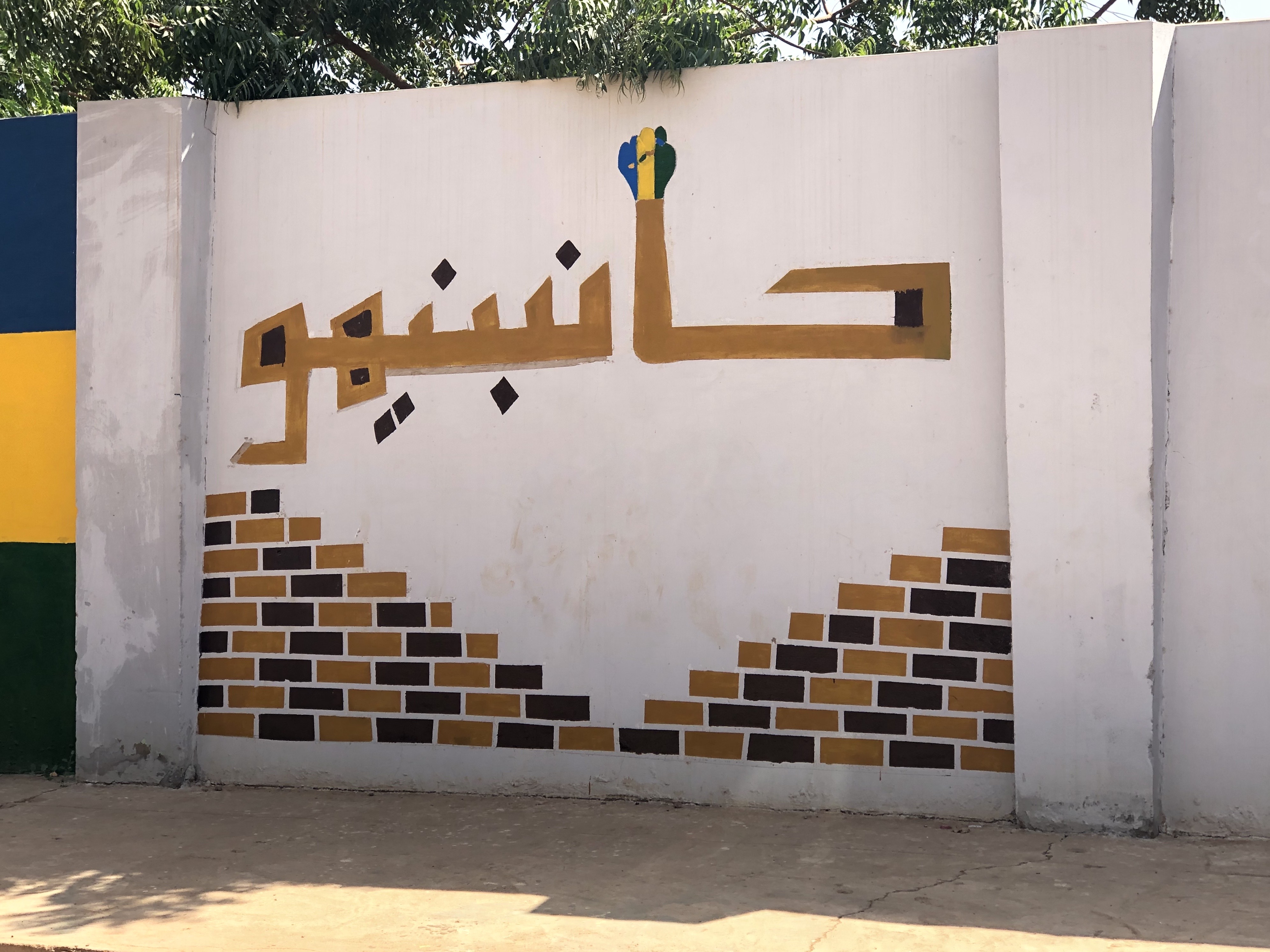
Late last summer, Nasredeen Abdulbari, 41, was in the Georgetown University Library, editing the fifth chapter of his dissertation on constitutional law and human rights, when he received a text message from a Sudanese civil society leader asking him to call urgently. Seismic changes were underway in Abdulbari’s home country of Sudan, where protesters had succeeded in ousting President Omar Hassan al-Bashir after 30 years of dictatorship. Abdulbari closed his laptop and stepped outside to make the call. “Civil society is nominating you to be the minister of justice,” the man on the other end of the line told him.
“I hope that is not the case,” Abdulbari replied.
Just over a month later, with his apartment in Virginia packed up neatly into boxes, Abdulbari was on a flight to Khartoum, the Sudanese capital. On the plane, Abdulbari devoted himself to mapping out his ideas for legal reform in Sudan. It looked overwhelming but orderly on paper: On one side were his plans for restructuring the Ministry of Justice itself; on the other side were his plans for broader changes to bring the Sudanese penal code in line with human rights protections.
Some 20 hours after leaving the United States, as the plane descended, Abdulbari sorted through his thoughts and feelings about what lay ahead. He had long believed that he could serve his country best from outside — by developing ideas for constitutional reform that could be fed back in if the opportunity arose. Suddenly, he was about to be very much on the inside.
Ten days later, after being sworn in as Sudan’s minister of justice, Abdulbari was on a plane again. This time, his destination was Geneva, for his first official overseas mission. Reaching his hotel room late in the evening, he opened the dossier prepared for him by the Sudanese Embassy in Geneva. Inside was the speech officials had drafted for him to give before members of the international community the following day.
There was nothing wrong, exactly, with the text that had been prepared for him, but it left him unmoved. He read it a second time. “It’s not reflective of the revolutionary spirit of Sudan,” he thought. It was now after midnight, but he got out his iPad and began writing his own speech, which he organized around freedom, peace and justice — the principles of the revolution.
As he took the seat behind the Sudan placard at the United Nations Human Rights Council the next morning, he couldn’t dislodge the voice of one of his law school professors: You should rehearse a speech 10 times before you present it. Here he was, his inaugural international appearance as Sudan’s minister of justice, with a speech he had finished revising at 7 a.m. and had not rehearsed once.
Six feet two inches tall, Abdulbari slouched over to reach the microphone. “As all of you know, women and men of my country successfully led a peaceful revolution,” he began. “Despite the excessive violence that the previous regime used, the people of Sudan persevered, proclaiming a motto of freedom, justice and peace.” Never lifting his eyes from the paper before him, he proceeded with a speech that would have been unimaginable coming from a Sudanese official just a year earlier. Citing Abraham Lincoln, he spoke of “transforming Sudan into a democratic nation, where our government will always be of the people, by the people and for the people.” Amid the authoritarian zeitgeist of our times, Abdulbari was offering an unabashed vision of a democratic future for his country.
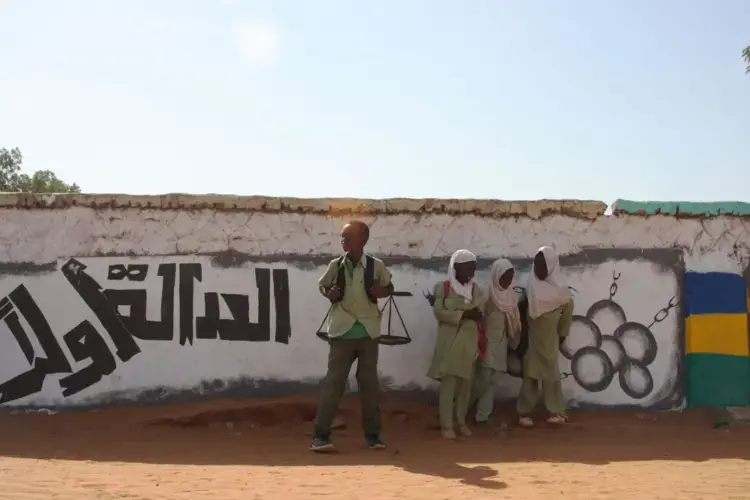
Bordering seven nations from East Africa to the Middle East, Sudan is home to roughly 40 million people. As with Britain’s other late-19th-century forays on the continent, colonialism fostered pathologies, including a divide-and-conquer approach to political control, which would wreak havoc on the country’s future. Since independence in 1956, Sudan has spent vastly more years at war with itself than at peace.
Sudan’s latest effort at democracy survived three years before Omar al-Bashir took power in a 1989 military coup. His National Islamic Front (subsequently renamed the National Congress Party, or NCP) instituted sharia law, thereby alienating all the non-Muslims in the country, not to mention much of the moderate Muslim population. Bashir quickly disbanded professional labor associations — a competing source of power — and instituted a system of surveillance through a National Intelligence and Security Service (NISS) that became notorious for its brutality. In the ’90s, the NCP’s decision to host Osama bin Laden led the United States to designate Sudan a state sponsor of terrorism, and it has suffered under a raft of economic sanctions that have placed it outside the international monetary system ever since.
During its 30-year reign, the NCP oversaw a staggering number of crimes against the Sudanese people. Millions in the peripheral parts of the country died at the hands of their own government. A 2009 arrest warrant for Bashir, issued by the Hague-based International Criminal Court, captures only a fraction of the violence, with charges of war crimes, crimes against humanity and genocide, for atrocities in Sudan’s western region, Darfur.
All the while, the underlying governance challenges facing the country have been left unaddressed. Key among them is creating a national consensus on what it means to be Sudanese in a population of breathtaking diversity. Also yet to be imagined is what it would take to build a system of government that would allocate resources impartially, rather than on the basis of ethnic, religious or regional identity. Likewise, there is no history of, or yet vision for, a government that uses the state’s natural and human resources for public good rather than private gain. In the past 30 years, corruption has become entrenched, kleptocracy the norm.
As extraordinary as the overthrow of Bashir was, it was not unprecedented. The Sudanese people have twice before succeeded in ousting their rulers. And if the past is prologue, the prospects for this revolution leading to democracy are poor. Sudan has long been stuck in an abysmal cycle, in which one ruler who fails to serve the majority of Sudanese is replaced by another suffering from the same deficit. The question for Abdulbari and other members of the transitional government now leading the country is: Can they break this pattern?
Abdulbari’s path to becoming Sudan’s minister of justice was paved by ordinary Sudanese. Starting in December 2018, after bread prices tripled overnight, people took to the streets calling for the downfall of the regime. Finally, in April 2019, the military ousted Bashir, and a self-designated military council took control. This was not, however, what the protesters had put their lives on the line for. They stayed out on the streets to demand civilian control and continued their protests even after a brutal attack in June — now referred to as the Khartoum Massacre — cost over 100 lives. Bodies of protesters, weighed down by bricks, were later retrieved from the Nile. “Those who did not deserve to die were killed by those who do not deserve to live,” reads one of the many public murals on Khartoum’s streets today.
Finally, negotiations between the protesters — who organized under a coalition called the Forces of Freedom and Change (FFC) — and the military council led to an agreement whereby the FFC would get to nominate most of the members of a cabinet to run the country’s bureaucracy for a three-year transitional period. Abdulbari was one of the FFC’s nominees. The transitional cabinet that he is now part of is tasked with laying the foundations for democratic elections in 2022. And the constitutional document governing the transitional period calls for the formation of a state that respects human rights.
Still, the deal did not bring complete civilian control of the government; the symbolic head of state throughout the transitional period is an 11-person Sovereignty Council, with five military members. Until a legislative council is formed, all changes to the law require the approval of the joint cabinet and Sovereignty Council by consensus or, failing that, by a two-thirds majority.
One of the military positions on the Sovereignty Council is filled by Gen. Mohamed Hamdan Dagalo, known as Hemedti. Now the most powerful man in Sudan, Hemedti heads the Rapid Support Forces (RSF), a brutal government militia that was formed in Darfur but that Bashir brought to Khartoum for his own protection during the latter months of his rule. With the RSF, Hemedti could have prevented Bashir’s ouster by the military. Instead, he betrayed his erstwhile benefactor and claimed for himself the title of protector of the revolution.
The RSF isn’t widely known outside Sudan, but its predecessor — the Janjaweed militia — is familiar to Western audiences on account of the vicious killings and mass rapes members conducted during the Darfur genocide. It was in these atrocities that Abdulbari’s ancestral village was destroyed and his father permanently displaced.
Abdulbari’s mother-in-law led him to accept the cabinet position: “She said to me, ‘This is a historical opportunity that does not come to everybody. Instead of writing articles about what to do, you will actually get to do it.’ ”
Abdulbari is an ethnic Fur, one of the groups that Bashir’s regime persecuted with the help of the Janjaweed. As a Fur in Sudan, and then as a Sudanese student in the United States, he has spent his life as an outsider.
Cerebral and preternaturally calm, Abdulbari is a born academic. By all accounts, his intellect was evident early on. At his elementary school in Mayo, an impoverished area where 120 students per grade squeezed into a classroom with a dirt floor, students were asked to recite what they had learned each morning. His teacher, Abboud Kodi, told me that in fifth grade, when students were just being introduced to the English alphabet, Abdulbari would make the recitation of all of his studies in English.
“I fell in love with English,” Abdulbari recalls. “I didn’t even know what I would use it for. I just wanted to learn it.” While his brothers headed out to play soccer after school, Abdulbari headed to the home of an older student in his neighborhood, urging the teenager to go through his English textbooks. “I would ask him to tell me the meaning of every word. I would write it down, in English and Arabic, and then study it, and memorize it.”
Fellow students from Abdulbari’s days at the University of Khartoum also remember him as intensely studious. “He was always running to the library. Literally running!” says Mohammed Hassan Eltaishi, a college friend who is now in one of the civilian positions on the Sovereignty Council.
After teaching at the University of Khartoum, Abdulbari sought out scholarships abroad to continue his studies. I met him when we were both students at Harvard Law School in 2007. We did not have any classes together, but three years after the U.S. government had determined the atrocities in Darfur to be genocide, all the student groups I was part of knew he was Darfuri. Towering above the rest of the student population, and appearing to be perennially cold in the Boston climate, he was impossible to miss on campus. I followed his career as he took up various academic fellowships and consultancies. Then, in 2018, he married a Sudanese doctor living in London, and last April he became a U.S. citizen.
Abdulbari’s plan had been to finish his dissertation and join his wife in London to do his postdoctoral work. After a lifetime of studying, he was looking forward to settling into a career as a law professor, earning a stable income and building a family. Taking up a senior governmental position in a country that had only just wrested freedom from a 30-year dictatorship was pretty much the antithesis of his vision for the future. Ultimately, though, a conversation with his mother-in-law led him to accept the FFC’s nomination. “She said to me, ‘This is a historical opportunity that does not come to everybody. Instead of writing articles about what to do, you will actually get to do it.’”
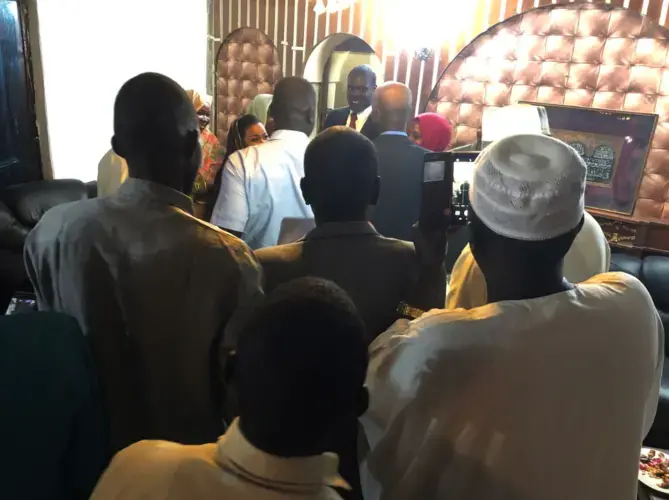
Were it not for the fact that his name is engraved on the minister of justice plaque on his desk, Abdulbari’s office would hold no mark of his presence. It is the exact office that his predecessor occupied: The oil painting behind his desk, the Koranic quote on a wall, the awards given to the Ministry of Justice by the former regime on the side table, and the boiled sweets in gold-plated bowls are all positioned as they were when he arrived. The first day I met Abdulbari there, I asked him why he had not personalized his surroundings. It evidently had not occurred to him. He shrugged. “I didn’t — I just started working,” he said.
He is but a temporary resident of a space that belongs to a future owner, and his work schedule reflects someone who is racing against the clock. “Sudan was never established as a modern state,” he told me. “We need to do it now. It is a chance that will not come again. The government that comes in 2022 should find all the foundations laid down, not have to start to build them.” Suddenly self-conscious about the torrent of words that had tumbled out with an unfamiliar animation, he took a breath and smiled. He starts his day at 6 a.m., and while he leaves the office by 8 or 9 p.m., he breaks only for dinner before working from home until after midnight.
All work within the Ministry of Justice is done on paper, as the department has yet to transition to electronic documentation. This creates delays that are visibly frustrating to Abdulbari, who became accustomed to a higher standard of efficiency after a decade in the United States. Other seemingly straightforward tasks crowd his time. None of the administrative staff in the ministry speak English well enough to schedule appointments with an array of Western actors suddenly eager to seize this unlikely opening of a window for democracy.
Office meetings fill out Abdulbari’s schedule from 9 a.m. to 4 p.m., Sunday through Thursday. The meetings with international delegations that I sat in on, in November, were standard diplomatic fare, in which he repeatedly laid out his plans to bring Sudanese laws in line with the goals of the revolution. “We must lay the foundations of a state that represents its people, without regard to religion, ethnicity or culture,” he told them. Hopeful, if skeptical, foreign officials listened intently before delivering predictable talking points. They expressed a desire to help but urged him to consider the value of getting some “quick wins” to demonstrate that the transitional cabinet was really serious about change. If Abdulbari felt the comments were patronizing, nothing in his composure showed it.
“We must lay the foundations of a state that represents its people, without regard to religion, ethnicity or culture,” Abdulbari told international visitors.
The domestic meetings, however, were entirely different. Ordinary Sudanese citizens who had never set foot in the ministry articulated their hopes and fears. One morning began with a group of journalists who spoke of a lifetime of detentions, and worse, under a regime that had viewed independent media as a source of treason. “We were never safe. The NCP gave thousands of press card credentials out to NISS [internal security] agents,” explained Ahmed Ahmed from the Khartoum Media Center. “NISS would turn up at press conferences, posing as journalists,” Ahmed’s colleague added. “Everyone was monitored.”
Abdulbari made a point of coming out from behind his imposing mahogany desk to sit more informally with them on the office’s couches. One by one, they articulated their ideas for legal reforms that would allow them to experience press freedom for the first time in their careers. “We have thought about how to amend the law. We have a press release about it,” Ahmed offered.
Abdulbari took copious notes on a legal pad. “Independent journalism is what safeguards a democratic society,” he told them. “Don’t worry about a press release. Just get me a draft law, and we’ll work on passing it.”
At the conclusion of the meeting, he went to escort them to the door. “Dr. Abdulbari — may we get a photograph with you before we leave?” Ahmed asked. Abdulbari posed for the same shot six times, to satisfy each person’s desire to get a photo on their own phone. “Everyone here calls me ‘doctor,’ ” he told me sheepishly, as the journalists left.
There was already another group in the reception area. Abdulbari welcomed them, and they took turns speaking to him as if he were the only person in the room. “I am asking you, Dr. Abdulbari, to make sure that Omar al-Bashir is handed over to the ICC,” implored the first man. An older woman with an easy laugh said, “I feel you are a brave man and will do justice.” She added, “I am a poet, and I will be writing a poem about you!” Abdulbari blushed.
The last to speak was a slight man in a sky-blue suit that looked as though it belonged to someone larger. “People in my community have heard that I was coming to your office, and they ask me to find out what you will be able to do,” he said. He spoke of people he knew in Atbara, where the protests began. “Nine people I know killed in the street,” he explained. Tears streamed down his face. Abdulbari paused his pen and just listened. The weight of the man’s grief, and the expectations he had of what Abdulbari could deliver, were palpable.
As he closed the door behind the last of the attendees, Abdulbari let out a heavy sigh. “So much sadness,” he said.
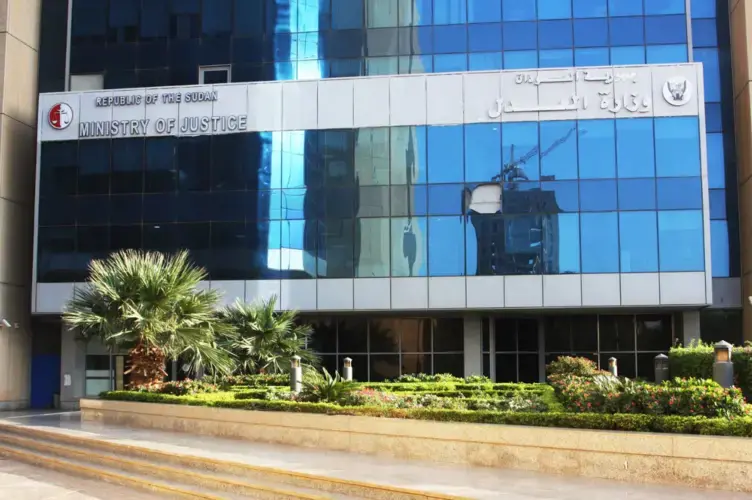
Abdulbari’s office at the Ministry of Justice, a recently constructed building, overlooks the Blue Nile River. From his window, the sprawling development of the capital spans out. For all of Sudan’s history, the beneficiaries of the state’s resources have largely fallen within this view. People from Darfur, or other peripheral areas like the Nuba Mountains, have never seen investment in their areas and have largely been excluded from the governance of the country. In Abdulbari, and other atypical members of the transitional cabinet, the revolution has brought people from the periphery to the center of power for the first time. It has also, however, anointed Hemedti, of the RSF, an outsider of a rather different kind, as kingmaker.
Hailing from a family of camel traders in Darfur, Hemedti is referred to by Khartoum’s elite as a “nothing” and a “thug” without so much as an elementary school education. Members of civil society are angry that the military, and Hemedti in particular, has any role in the governance of Sudan. And his RSF militia’s brutality during the Khartoum Massacre in June only strengthens those sentiments. During my visit, those militia, piled into weaponized pickup trucks, were ubiquitous throughout the capital. They are answerable solely to Hemedti — who, meanwhile, sits on the Sovereignty Council and helps decide whether the reforms that the Ministry of Justice drafts will become law.
Abdulbari insists, repeatedly, that the transitional arrangement “will work. It must work.” It is not as though Abdulbari is at any remove from the damage that Hemedti and his militia wrought in Darfur. Yet, by Abdulbari’s account, the cabinet’s relationship with Hemedti and the rest of the Sovereignty Council is functioning well.
I asked Hemedti about this, as his media adviser hovered nervously. The military’s role was to “ensure that the civilian government would succeed,” Hemedti said, referring to scripted notes. Later, speaking extemporaneously about the Ministry of Justice, Hemedti said that when the Sovereignty Council debated whether Abdulbari could undertake a cabinet position as a dual citizen, he personally argued in favor of him. (Another member of the council confirmed this account.) “Over the past 30 years, most qualified people left the country because of the former regime,” Hemedti said. “In order to get their expertise back, we need to accept double citizenship.”
It is true that over the past three decades, many talented Sudanese have left the country; those who stayed had limited opportunities for development unless they joined the NCP. Abdulbari is part of a wave of Sudanese who are returning from the diaspora. And it is with the evident, albeit improbable, blessing of Hemedti that he now oversees a ministry of 1,600 civil servants, as he assumes the daunting task of bringing Sudanese law into conformity with international human rights.
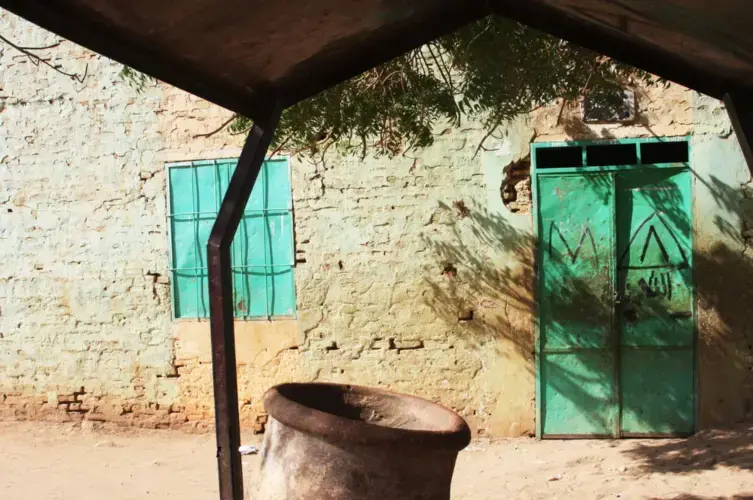
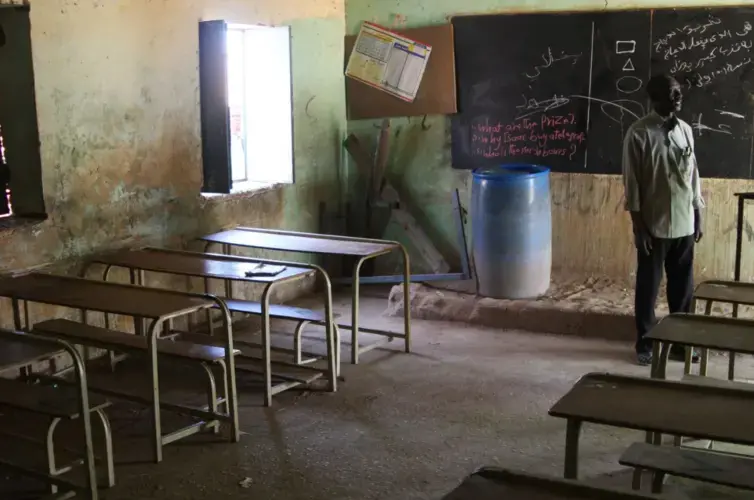
Back in Sudan after so many years abroad, Abdulbari has been adjusting to the loss of anonymity that comes with transitioning from being a foreign graduate student to a homegrown celebrity. On his third night in the country, he went out for dinner with friends from his days at the University of Khartoum. At the end of the meal, a man he had never met came up to them to say he had paid their bill. Abdulbari was taken aback. “I told him there was no need to do this,” he recalls. But the man insisted. “He told us that for his whole life, whenever he saw a government minister, his blood pressure would go up,” recalls Mohamed Osman Elbadri, who was at the meal. Elbadri offered him a contact number, but the man refused. “He said he didn’t want anything from the minister. He was just very happy to see him,” Elbadri says. “He told us he was excited to have a young person, who is the minister of justice, eating here with us.”
Reflecting on the incident later, I watched Abdulbari’s eyes well up. “It is a moment I will never forget in all my life,” he said quietly.
With the fall of Bashir’s regime, and the installation of civilian cabinet members, there are these moments of connection between citizens and officials. But distrust remains widespread. The NCP had entrenched themselves throughout the government bureaucracy. Though the transitional government passed a law, drafted by Abdulbari, to dissolve the NCP as a political party, this doesn’t mean that individuals who are loyal to the NCP have disappeared. And striving to live the ideals they espouse, the cabinet has avoided the retaliatory purges so often associated with an overthrow.
Abdulbari has been adjusting to the loss of anonymity that comes with transitioning from being a foreign graduate student to a homegrown celebrity.
It was against this complicated backdrop that civil society groups gathered outside the Ministry of Justice building with petitions for reform that they refused to hand to anyone but Abdulbari himself. In his first weeks on the job, Abdulbari would personally greet each group of petitioners who gathered outside. From his office, through the biometrically secured door, down 14 floors in the elevator and through two security checkpoints, he would make his way out to them. “I understood their fear of communicating with anyone but me,” he explains. But eventually the time cost was too great, and he and his chief of staff decided on a policy of sending a representative of the office down to receive petitions.
The new policy backfired when a group of teenage girls from the Islamist movement brought a petition to oppose Sudan signing on to the international convention to eliminate discrimination against women, known as CEDAW. They filmed themselves outside the Ministry, with one of them saying that Abdulbari had refused to meet them, despite having previously met with women who supported CEDAW. This, the teenager said, was proof that he was biased against Islam. The video went viral on Sudanese social media. The fact that some 189 other nations, including Islamic stalwarts like Saudi Arabia and the United Arab Emirates, have joined CEDAW has not slowed the spread of the Islamists’ propaganda.
The charge of an anti-Islam bias is the repeated call of the political Islamists in Khartoum, whose Friday sermons are dedicated to arguing that the transitional government in general, and Abdulbari in particular, is not simply opposed to the former regime, but opposed to Islam itself. The particular ire that Abdulbari has drawn stems from his public and unwavering support for CEDAW.
For those who backed the revolution, having the Sudanese government sign CEDAW would be a concrete sign of change from a regime that spent three decades denigrating its female population. In his meetings with CEDAW opponents, Abdulbari says, he is often told that his effort to bring Sudan into conformity with international human rights standards is an affront to Sudanese culture. “I respond by asking, which Sudanese culture? We have more than one. Sudan is a very diverse country.”
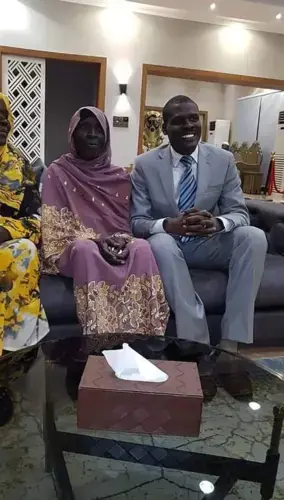
In discussing the formation of his views on the role of women in Sudanese society, Abdulbari described his mother to me as “the bedrock of my life.” So I traveled to the home where she raised him and his siblings, on the outskirts of Khartoum. There were festivities underway the day I arrived. Some two dozen relatives gathered under a makeshift awning to celebrate the birth of Abdulbari’s nephew. I asked what the baby’s name was. “Nasredeen!” replied Abdulbari’s brother Sabri with a laugh. “Actually, I had no choice. He was born when Nasredeen was named the minister of justice, and my mom insisted he could have no other name.”
Abdulbari’s mother, Kalthoum Ismail, was approaching 80 years old. Though stooping slightly, she was a tall woman whose height seemed amplified by the amount of respect given to her by everyone present. The traditional markings carved down her cheeks gave the impression of a permanent stream of tears. Like Abdulbari, her repose was serious, almost stern, but her face lit up as she ushered me inside the house to speak about her famous son.
The ground was covered in brightly colored woven mats, and a flat-screen television playing on mute provided light to the otherwise unlit room. The room was, I learned, one of the many improvements that had been made to the house over time as Abdulbari sent back all he could from his student stipends in the United States.
Ismail explained that before Abdulbari was born, she farmed nuts for oil in a lush area of Darfur. She was married to Abdulbari’s father, an Islamic religious scholar, and the land provided everything they needed. But Darfur offered limited educational opportunities for their children. The family moved to Khartoum; however, Abdulbari’s father missed life in Darfur and decided to return, leaving Ismail to raise Abdulbari and his six siblings. It was a struggle to support the family, but Abdulbari and his siblings helped out.
“We call her our mother and our father,” explained Sabri, looking at his mother with pride. In periods when feeding all seven children was impossible, Ismail sent Abdulbari and his brothers to stay with an uncle. Her recollections of Abdulbari as a child matched his persona in adulthood. “He was just always very calm and quiet,” she recalled. “His only real friend was his brother because he always just came home and studied.”
When I asked Ismail how she reacted to Abdulbari’s appointment, she began bouncing in her chair and laughing. “I couldn’t eat the whole day. Everyone from everywhere was calling me. They said, you are from here and your son is the minister of justice?” She sat back and adjusted her headscarf. “I felt like all I had done in the past was not a waste.”
Tragically, Ismail would not get to see what her son might accomplish in his new position. Two months after I met her, I received an email from Abdulbari: “My beloved mother, the woman who made me who I am, [has] passed away.”
Before leaving Khartoum, I asked Abdulbari again whether a transitional arrangement that includes Hemedti and other bad actors from the previous regime can really work. “They are supporting us to transition to democracy in three years, and their actions so far have been very supportive,” he said, in a way that suggested he had nothing further to say on the topic.
Foreign diplomats speak of the political naivete of the cabinet of technocrats that Abdulbari is part of. Certainly the odds of a democratic society emerging from any dictatorship are impossibly long, and Sudan’s history makes success particularly hard to imagine. At least for the moment, though, these technocrats are supported by a coalition of civil society groups who managed to overthrow a dictatorship that years of wide-ranging U.S. government sanctions and an international arrest warrant had barely affected at all.
During my last visit to his office, Abdulbari thumbed through a pile of papers on his desk. I commented that he looked tired, but he seemed not to hear me. “Before you go, I would like to show you something,” he said. He explained he had drafted legislation to revoke the so-called public order laws that Bashir’s regime had used as a pretext to harass and detain women who opposed the NCP. Eventually he found what he was looking for. “Here,” he said, holding up a page of bullet points. Each line revoked a provision of the existing penal code, ranging from the criminalization of women for dress infractions, such as wearing trousers, to the authorization of their public flogging. “Just one page,” he noted, a dimple appearing at the side of his mouth. He returned the paper to the pile and looked at me. “I am exhausted. But when I think of this opportunity I have that no one else has, the exhaustion falls away.”
Soon after I arrived back in the United States, Abdulbari sent me a WhatsApp message. It contained no text, just a link to a news article: Sudan repeals public order laws, the headline announced. Abdulbari had spent years thinking about the role of the law in post-colonial states like Sudan, where a diverse array of people have been drawn inside a national boundary. He had been developing a constitutional theory, grounded in human rights principles, for the governance of his country. Now he was implementing it.


